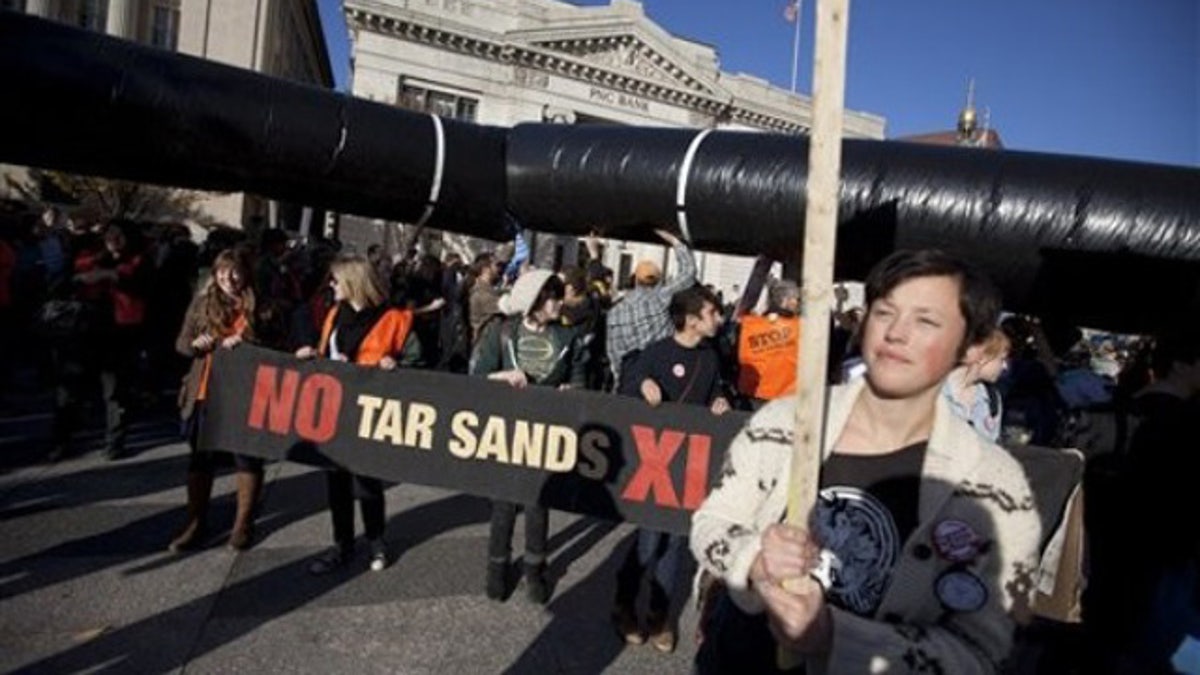
Nov. 6, 2011: Demonstrators march with a replica of a pipeline during a protest to demand a stop to the Keystone XL tar sands oil pipeline in Washington, D.C. (AP)
House Republicans plan to punt until late February a controversial transportation bill that includes a provision to fast-track the Keystone XL pipeline, as rank-and-file Republicans raise concerns and the White House issues a veto threat.
Some conservatives in the House GOP caucus oppose the levels of highway spending in the bill, despite efforts by Republican leaders to pay for the provisions and strip out earmarks, as well as include sweeteners like the Keystone rider.
On the other side, the Obama administration says the bill doesn't spend enough, and is adamantly opposed to congressional meddling in the pipeline debate.
Complicating matters is the fact that nearly 300 amendments have been filed to the package.
Amid the debate, senior House GOP leaders told Fox News on Wednesday that they do not intend to finish the bill until late February. Formal debate on the bill was likely to begin on Thursday.
House Republicans have proposed spending about $260 billion over nearly five years. GOP leaders said Tuesday they intend to divide the transportation package into three bills -- the strategy is to allow lawmakers who oppose certain provisions to vote against those portions, while still supporting the heart of the bill. Afterward, the House clerk will stitch the three bills together.
The bill's treatment of mass transit programs has riled urban lawmakers, including New York and Chicago metro-area Republicans who may wind up voting against the bill. It eliminates the guarantee of a portion of federal gasoline and diesel tax revenues for transit, leaving programs vulnerable to future budget cuts.
The bill also includes provisions opening leases in the Arctic National Wildlife Refuge in Alaska to oil drilling. The provisions, which include opening the East and West coasts and portions of the Florida Gulf Coast, as well as ANWR, to drilling, are supposed to help pay for transportation programs. The Congressional Budget Office, though, estimates they would raise less than $5 billion over 10 years for the federal government.
The bill also eliminates locally popular federal programs that help underwrite bike paths, bike lanes and pedestrian safety projects, including the Safe Routes to School program, in order to concentrate funding on highways.
Rep. John Mica, R-Fla., chairman of the House Transportation and Infrastructure Committee and co-author of a major portion of the bill, said he is "fairly confident" based on his discussions with GOP lawmakers that the bill can pass.
"This is going to be the No. 1 job creator and economic generator bill of this entire session (of Congress)," he said.
But the Obama administration has blasted the House bill.
"The House bill takes us back to the dark ages," Transportation Secretary Ray LaHood, a former Republican congressman, told reporters Monday. He said he doesn't expect any Democrats to vote for the bill.
In a statement Tuesday threatening a veto, the Obama administration said it has "serious concerns with provisions in the bill that would make America's roads, rails, and transit systems less safe, reduce the transportation options available to America's traveling public, short circuit local decision-making, and turn back the clock on environmental and labor protections."
The statement also criticized the bill for its attempt to deal with Keystone.
"This bill seeks to circumvent a longstanding process for determining whether cross-border pipelines are in the national interest," the statement said.
President Obama last month decided to deny a critical permit for the Canada-to-Texas oil pipeline, pushing off the project and forcing company TransCanada to reapply. Obama rejected the permit, after Republicans tried to compel a decision from the administration, saying it was too brief a time to study new routing for the pipeline. With the provision in the latest transportation bill, Republicans have since tried to make an end run around the State Department, which typically has jurisdiction over cross-border permits.
Things appear to be going more smoothly in the Senate, which is considering a bipartisan plan that proposes to spend $109 billion over less than two years.
Debate began on the Senate bill late last week with a strongly bipartisan procedural vote of 85-11, and is continuing this week. The bill is co-authored by Sens. Barbara Boxer, D-Calif., and James Inhofe, R-Okla., ideological opposites who have managed to overcome substantial disagreement in an effort to pass a bill.
Fox News' Chad Pergram and The Associated Press contributed to this report.












































